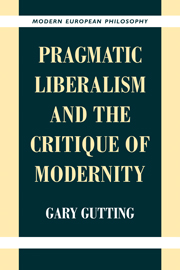Pragmatic Liberalism
Concluding Reflections
Published online by Cambridge University Press: 05 June 2012
Summary
The preceding parts have developed pragmatic liberalism through a series of variations on themes from Rorty, MacIntyre, and Taylor. By way of conclusion, I offer a recapitulation of the pragmatic liberal position and a coda on its metaphilosophical implications.
Recapitulation
Pragmatic liberalism is my response to the problem of modernity. The position arises from a critique of classical modern claims to ground knowledge in a body of distinctive fundamental knowledge, whether epistemological or ethical. The pragmatic liberal regards both knowing and doing as nothing more than human social practices, governed by norms derived entirely from the deep desires that constitute individuals as members of cognitive and moral communities. This position rejects the project of the philosophical Enlightenment in favor of the affirmation of ordinary life characteristic of the humanistic Enlightenment. The Enlightenment ideal of autonomy is ensured by situating all norms entirely within human communities. Critics may urge that pragmatic liberalism nonetheless abandons the Enlightenment commitment to reason. But this is so only with respect to a philosophical reason claiming a privileged perspective on reality. There is a full endorsement of our ordinary modes of knowledge and of the truths, both humdrum and scientific, that they yield. With regard to such knowledge, all that is rejected are incoherent philosophical theories of justification and truth. Pragmatic liberalism allows but does not require any of a range of views on the objectivity of values; my own view is that there is no basis for asserting the absolute or phenomenological objectivity of values but that some values may well be perspectivally objective.
- Type
- Chapter
- Information
- Pragmatic Liberalism and the Critique of Modernity , pp. 163 - 194Publisher: Cambridge University PressPrint publication year: 1999

